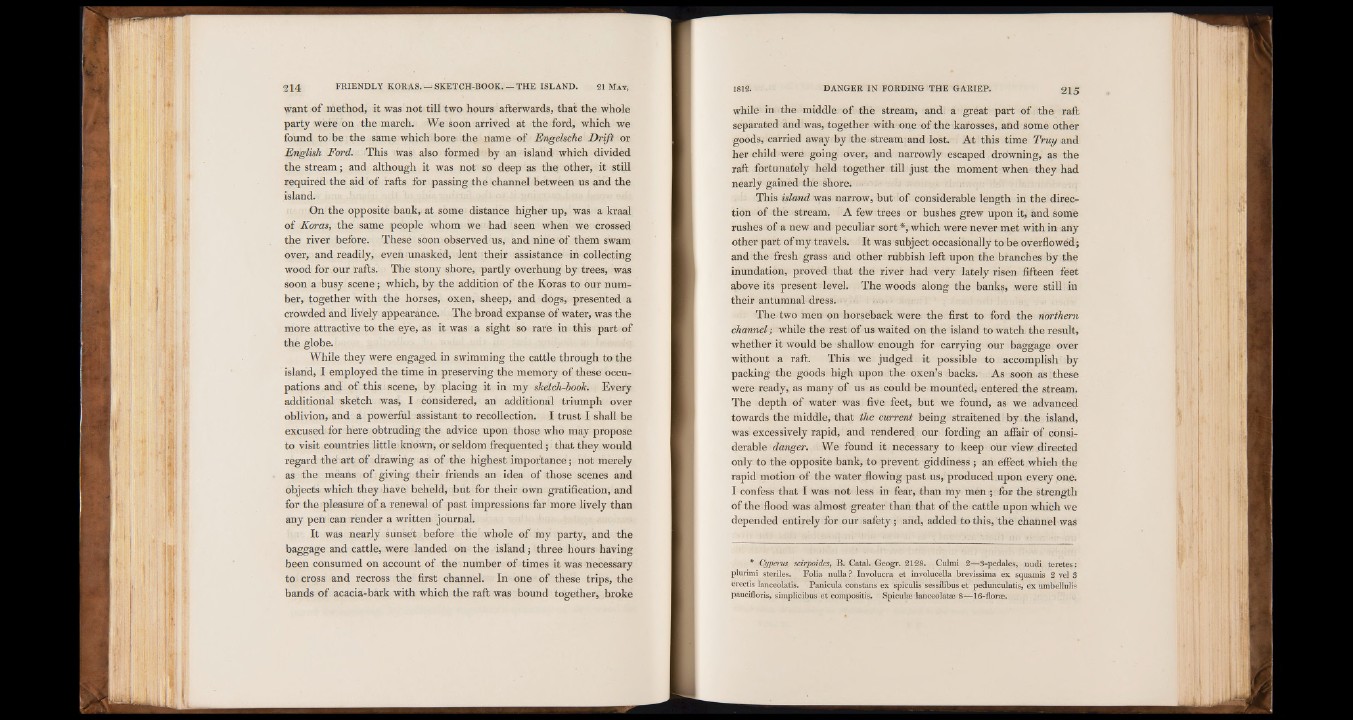
want of method, it was not till two hours afterwards, that the whole
party were on the march. We soon arrived at the ford, which we
found to be the same which bore the name of Engelsche Drift or
English Ford. This was also formed by an island which divided
the stream; and although it was not so deep as the other, it still
required the aid of rafts for passing the channel between us and the
island.
On the opposite bank,, at some distance higher up, was a kraal
of Koras, the same people whom we had seen when we crossed
the river before. These soon observed us, and nine of them swam
over, and readily, even unasked, lent their assistance in collecting
wood for our rafts. The stony shore, partly overhung by trees, was
soon a busy scene; which, by the addition of the Koras to our number,
together with the horses, oxen, sheep, and dogs, presented a
crowded and lively appearance. The broad expanse of water, was the
more attractive to the eye, as it was a sight so rare in this part of
the globe.
While they were engaged in swimming the cattle through to the
island, I employed the time in preserving the memory of these occupations
and of this i scene, by placing it in my sketch-book. Every
additional sketch was, I considered, an additional triumph over
oblivion, and a powerful assistant to recollection. I trust I shall be
excused for here obtruding the advice upon those who may propose
to visit countries little known, or seldom frequented; that they would
regard the' art of drawing as of the highest importance; not merely
as the means of giving their friends an idea of those scenes and
objects which they have beheld, but for their own gratification, and
for the pleasure of a renewal of past impressions far more lively than
any pen can render a written journal.
It was nearly sunset before the whole of my party, and the
baggage and cattle, were landed on the island; three hours having
been consumed on account of the number of times it was necessary
to cross and recross the first channel. In one of these trips, the
bands of acacia-bark with which the raft was bound together, broke
while in the middle of the stream, and a great part of the raft
separated and was, together with one of the karosses, and some other
goods, carried away by the stream and lost. At this time Truy and
her child were going over, and narrowly escaped drowning, as the
raft fortunately held together till just the moment when they had
nearly gained the shore.
This island was narrow, but of considerable length in the direction
of the stream. A few trees or bushes grew upon it, and some
rushes of a new and peculiar sort *, which were never met with in any
other part of my travels. It was subject occasionally to be overflowed;
and the fresh grass and other rubbish left upon the branches by the
inundation, proved that the river had very lately risen fifteen feet
above its present level. The woods along the banks, were still in
their antumnal dress, i
The two men on horseback were the first to ford the northern
channel; while the rest of us waited on the island to watch the result,
whether it would be shallow enough for carrying our baggage over
without a raft. This we judged it possible to accomplish by
packing the goods high upon the oxen’s backs. As soon as these
were ready, as many of us as could be mounted, entered the stream.
The depth of water was five feet, but we found, as we advanced
towards the middle, that the current being straitened by the island,
was excessively rapid, and rendered our fording an affair of considerable
danger. We found it necessary to keep our view directed
only to the opposite bank, to prevent giddiness ; an effect which the
rapid motion of the water flowing past us, produced upon every one.
I confess that I was not less in fear, than my men ; for the strength
of the flood was almost greater than that of the cattle upon which we
depended entirely for our safety; and, added to this, the channel was
* Oyperus scirpoides, B. Catal. Geogr. 2128. Culmi 2—3-pedales, nudi teretes:
plurimi steriles. Folia nulla? Involucra et involucella brevissima ex squamis 2 vel 3
erectis lanceolatis. Panicula coiistans ex spiculis sessilibus et pedunculatis, ex umbellulis
paucifloris, simplicibus et compositis. Spiculse lanceolata; 8-—16-florae.